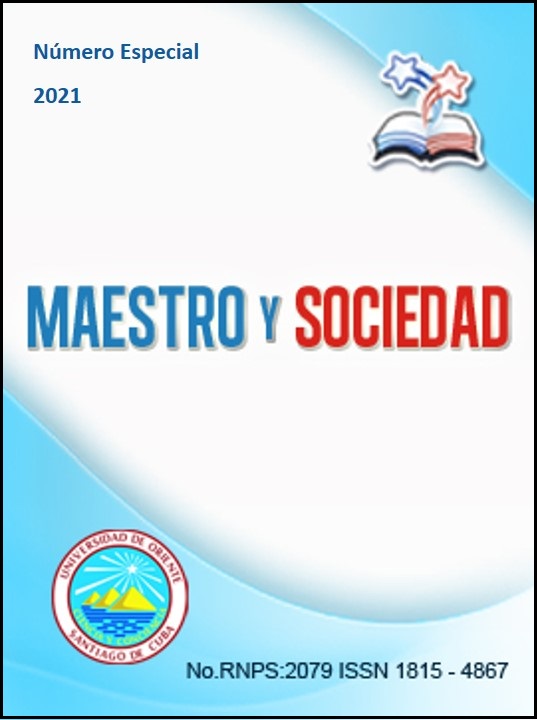Reflections on strategies to strengthen critical thinking in students
Array
Keywords:
Critical thinking, strategies, education, studentsAbstract
The process of strengthening Critical Thinking must consider the empowerment of an active attitude of the student, including their protagonism in their own learning process, for this it is essential to develop contextualized strategies. In this sense, the present study aims to reflect on strategies to develop critical thinking in students. A documentary analysis of hermeneutical inquiry was carried out. The results confirm scientific evidence of strategies that allow to strengthen critical thinking, such as: strategies based on inquiry and experimentation, metacognitive strategies for self-knowledge and self-regulation, evaluation strategies and formative feedback, problem-based learning, learning argumentation, strategies ICT-based, cause-effect strategies. It is concluded that from educational practice, strategies must be analyzed, adapted and contextualized to have better achievements in the development of critical thinking in students, evaluating even which ones may be more relevant in pandemic contexts.
References
2. Deroncele Acosta, A., Nagamine Miyashiro, M., y Medina Coronado, D. (2020). Bases epistemológicas y metodológicas para el abordaje del pensamiento crítico en la educación peruana. Revista Inclusiones. 7(Número Especial), 68-87.
3. Deroncele Acosta, A., Gross Tur, R., y Medina Zuta, P. (2021). El mapeo epistémico: herramienta esencial en la práctica investigativa. Universidad Y Sociedad, 13(3), 172-188. Recuperado a partir de https://rus.ucf.edu.cu/index.php/rus/article/view/2088
4. Leiva, F. (2016). ABP como estrategia para desarrollar el pensamiento lógico matemático en alumnos de educación secundaria. Sophía, 2(21), 209. https://doi.org/10.17163/soph.n21.2016.09
5. León, M. (2020). Evaluación formativa: el papel de retroalimentación en el desarrollo del pensamiento crítico. Maestro y Sociedad, 18(2), 1–69. https://maestroysociedad.uo.edu.cu
6. Madrid, J. (2018). Prácticas Pedagógicas Del Docente De Ciencias Sociales Para El Desarrollo Del Pensamiento Crítico Y Competencias Ciudadanas En Contextos De Vulnerabilidad Social. Revista Latinoamericana de Estudios Educativos, 14(1), 150–168. http://orcid.org/0000-0003-0838-6510.
7. Mahbubah, K., Habibulloh, M., Hermita, N., y Samsudin, A. (2020). Measuring Critical Thinking based Multimedia on Buoyant Force Concept: A Preliminary Design. Journal of Physics: Conference Series, 1655(1). https://doi.org/10.1088/1742-6596/1655/1/012112
8. Medina, F. (2017). Programa critical para desarrollar pensamiento crítico en estudiantes de cuarto de secundaria de una institución educativa del callao. MAESTRIA. 108.
9. Medina Zuta, P., Deroncele Acosta, A. (2019a). La construcción científico-textual en el posgrado: el desafío de la transdisciplinariedad y la reflexividad. Revista Maestro y Sociedad, 16(4), 829-838. https://maestroysociedad.uo.edu.cu/index.php/MyS/article/view/5015
10. Medina Zuta, P., Deroncele Acosta, A. (2019b). La evaluación formativa desde el rol del docente reflexivo. Revista Maestro y Sociedad, 16(3), 597-610. https://maestroysociedad.uo.edu.cu
11. Medina Zuta, P., y Deroncele Acosta, A. (2020). La práctica dialógico-reflexiva: una experiencia formativa en los procesos de construcción científico-textual en el postgrado. Órbita Pedagógica, 7(1), 37-46.
12. Medina Zuta, P., Deroncele Acosta, A. (2020). La práctica investigativa dialógico-reflexiva para orientar la problematización como operador epistémico de la construcción científico-textual. Revista Inclusiones, 7(2), 160-174.
13. Montiel, M. A., Charles, D. G., y Lizett, S. (2018). Método de casos como estrategia didáctica para desarrollar el pensamiento crítico en estudiantes de turismo. Ciencia, Docencia y Tecnología, 29(Vol29No57), 88–110. https://doi.org/10.33255/2957/378
14. MorenoW. E., y Velázquez, M. E. (2017). Estrategia Didáctica para Desarrollar el Pensamiento Crítico. REICE. Revista Iberoamericana Sobre Calidad, Eficacia y Cambio En Educación, 15.2(2017). https://doi.org/10.15366/reice2017.15.2.003
15. Nussbaum, M., Barahona, C., Rodriguez, F., Guentulle, V., Lopez, F., Vazquez-Uscanga, E., y Cabezas, V. (2021). Taking critical thinking, creativity and grit online. Educational Technology Research and Development, 69(1), 201–206. https://doi.org/10.1007/s11423-020-09867-1
16. Priawasana, E., Degeng, I. N. S., Utaya, S., y Kuswandi, D. (2020). An experimental analysis on the impact of elaboration learning on learning achievement and critical thinking. Universal Journal of Educational Research, 8(7), 3274–3279. https://doi.org/10.13189/ujer.2020.080757
17. Quintero, V. L., Palet, J. E. A., y Olivares, S. L. O. (2017). Desarrollo del pensamiento crítico mediante la aplicación del aprendizaje basado en problemas. Psicologia Escolar e Educacional, 21(1), 65–77. https://doi.org/10.1590/2175-3539/2015/02111072
18. Renatovna, A. G., y Renatovna, A. S. (n.d.). Journal of critical reviews developing critical thinking on elementary class pupils is the most important factor for preparing social relationship (vol. 7).
19. Rímac, G. D., Velázquez, M. E., y Hernández, R. (2017). Estrategias innovadoras para contribuir al desarrollo del pensamiento crítico. Revista de Educación, VIII(10), 31–60.
20. Roca, J. (2013). El desarrollo del Pensamiento Crítico a través de diferentes metodologías docentes en le Grado de Enfermería. 429.
21. Tamayo, O. E., Zona, R., y Loaiza, Y. E. (2015). Pensamiento Crítico en la Educación. Algunas categorías centrales para su estudio. 11(2), 111–133. http://190.15.17.25/latinoamericana/downloads/Latinoamericana11(2)_6.pdf
22. Tenreiro, C., y Vieira, R. M. (2021). Promoting critical and creative thinking in science teaching: Educational proposals and their contributions in Portuguese students. Investigacoes Em Ensino de Ciencias, 26(1), 70–84. https://doi.org/10.22600/1518-8795.ienci2021v26n1p70
23. Torres, D. L., Fonseca, W. P., y Pineda, B. N. (2017). Las vivencias como estrategia de fortalecimiento del pensamiento crítico en educación rural. Praxis & Saber, 8(17), 201. https://doi.org/10.19053/22160159.v8.n17.2018.7207
24. Willingham, D. T. (2019). How Can Educators Teach Critical Thinking? www.aft.org/ae/spring2020/debruyckere_kirschner_hulshof.
25. Willingham, D. T. (2020). Ask the cognitive scientist: How can educators teach critical thinking? American Educator, 44(3), 41–51. link.gale.com/apps/doc/A638905025/AONE?u=otta77973&sid=AONE&xid=d4a7eabc
26. Yılmaz, N., y Tabak, S. (2019). The effect of argumentation-based social studies teaching on academic achievement, attitude and critical thinking tendencies of students. International Electronic Journal of Elementary Education, 12(2), 213–222. https://doi.org/10.26822/iejee.2019257669
Published
How to Cite
Issue
Section
License
This journal provides immediate open access to its content, based on the principle that offering the public free access to research helps a greater global exchange of knowledge. Each author is responsible for the content of each of their articles.



























 Universidad de Oriente
Universidad de Oriente 